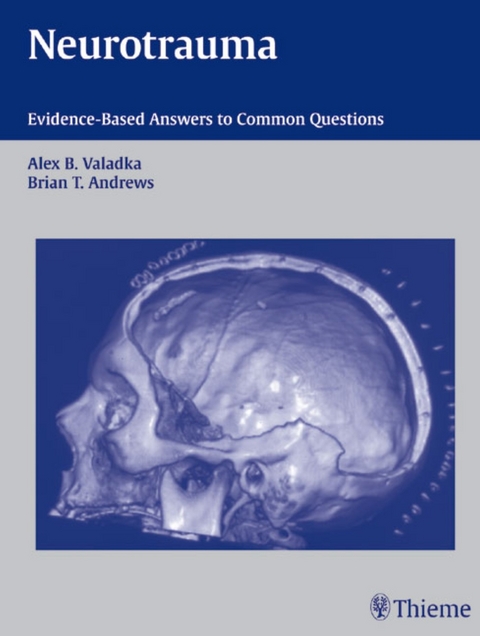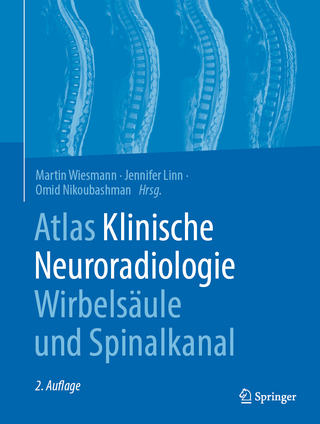
Neurotrauma
Thieme Medical Publishers Inc (Verlag)
978-1-58890-266-5 (ISBN)
- Titel ist leider vergriffen;
keine Neuauflage - Artikel merken
Combining new, evidence-based literature with the hands-on experience of leading specialists, this book provides the practical approach clinicians need, especially when dealing with an emergency situation. Each chapter examines a question frequently encountered during neurotrauma care, offering clear and succinct answers to core topics. Most importantly, internationally recognized experts explain why they agree or disagree with a specific study, adding unique insights into vital patient management issues.
Special highlights:
Tightly focused chapters target key questions for quick and easy reference
Answers reflect the best available data, ensuring accuracy and underscoring the validity of the authors' recommendations
Top authorities in the field draw on their own clinical experience to provide differing viewpoints
Valuable coverage of related topics, such as resuscitation methods, classification of head and spinal cord injuries, imaging protocols for head injuries, post-acute care, and more
Through reliable data and respected opinions, this text is sure to improve your diagnostic and decision-making skills. An ideal way to ''confer'' with the experts, it belongs in the libraries of all neurosurgeons, trauma specialists, general surgeons, neurologists, and emergency room physicians.
Dept. of Neurosciences, California Pacific Medical Center; Dept. of Neurological Surgery, University of California at San Francisco, San Francisco, CA, USA
I. Resuscitation and Initial Assessment
1. Does It Matter How Head-Injured Patients Are Resuscitated?
2. What Is the Best Way to Assess and Classify Head-Injured Patients?
3. What Is the Best Way to Assess and Classify Spinal Cord-Injured Patients?
4. When Are Computed Tomography Scans and Skull X-Rays Indicated for Patients with Minor Head Injury?
5. What Is the Best Way to Rule Out Spine or Spinal Cord Injury in a Trauma Patient, Especially When Head Injury Is Present?
6. How Can I Decide That a Head-Injured Patient Can't Be Salvaged?
II. Issues Common to Head Injury and Spinal Cord Injury
7. Can Special Beds Reduce the Incidence of Complications in Head-Injured and Spinal Cord-Injured Patients?
8. What's the Safest Way to Prevent Deep Vein Thrombosis and Pulmonary Embolism After Head or Spinal Cord Injury? How Soon After Surgery Can I Anticoagulate My Patients Who Develop Deep Vein Thrombosis?
III. Brain Injury
Monitoring
9. When and How Should I Monitor Intracranial Pressure?
10. Should I Monitor Jugular Venous Oxygen Saturation?
11. Should I Monitor Brain Tissue PO2?
12. Should I Monitor Cerebral Blood Flow After Traumatic Brain Injury?
General Management of Brain-Injured Patients
13. Does Raising Cerebral Perfusion Pressure Help Head-Injured Patients?
14. What Are the Best Ventilator Settings for Head-Injured Patients? What Is the Role of Hyperventilation?
15. What Is the Optimal Hematocrit and Hemoglobin for Head-Injured Patients?
16. How Soon Should Patients Receive Nutrition? How Much, Which Formulation, and by Which Route?
17. Are There Safe Upper and Lower Limits for Serum Sodium and Serum Osmolality in Head-Injured Patients? Should I Use Hypertonic Saline or Fluid Restriction to Treat Hyponatremia?
18. When Should Follow-Up Computed Tomography Scans Be Obtained?
19. Do Patients with Intracranial Pressure Monitors Need Prophylactic Antibiotics?
20. Do Head-Injured Patients Need Prophylactic Anticonvulsants? For How Long?
21. Are Steroids Indicated in the Treatment of Head Injury?
22. Does Following the Recommendations in the Guidelines for the Management of Severe Traumatic Brain Injury Make a Difference in Patient Outcome?
23. Why Have Therapeutic Trials in Head Injury Been Unable to Demonstrate Benefits?
Treatment of Elevated Intracranial Pressure
24. At What Level Should I Start Treating Elevated Intracranial Pressure?
25. Is There a "Best" Way to Give Mannitol?
26. Should I Use Hypertonic Saline to Treat High Intracranial Pressure?
27. Does Barbiturate Coma Help to Improve Outcome from Head Injury?
28. Does Hypothermia Improve Outcome?
29. Does Decompressive Craniectomy Really Improve Outcome After Head Injury?
30. What's the Best Algorithm for Treating Intracranial Hypertension?
Special Circumstances
31. Simultaneous Intracranial and Abdominal Injury: Which Gets Operated on First, and Which Has the Higher Treatment Priority?
32. When Should Head-Injured Patients with Long-Bone Fractures Undergo Surgical Treatment of Their Fractures?
33. When Should I Suspect Child Abuse in Head-Injured Children?
34. Can I Say "No" If a Family Wants to Support a Vegetative Patient Indefinitely?
IV. Spinal Cord Injury
General Management of Spinal Cord-Injured Patients
35. Does Methylprednisolone Help Patients with Spinal Cord Injury?
36. Are There New Therapies That Improve Outcome in Spinal Cord-Injured Patients?
37. When Is It Safe to Extubate a Newly Quadriplegic Patient? When Is Early Tracheostomy Appropriate?
38. How Do I Diagnose and Manage SCIWORA?
Surgical Treatment
39. Do I Need to Decompress Patients with Spinal Cord Injury Right Away?
40. When Is Surgery Indicated for Patients with Gunshot Wounds to the Spine?
V. Postacute Care
41. What Is the Outcome of Patients with Mild, Moderate, or Severe Traumatic Brain Injury?
42. How Well Can Patients Be Expected to Recover After Spinal Cord Injury?
43. Does Rehabilitation Facilitate Neurologic Recovery After Spinal Cord Injury?
VI. Sports Medicine
44. How Soon After Head Injury (With or Without Craniotomy) Can Patients Resume Contact Sports?
45. How Important Are Stingers?
46. Do Return-to-Play Recommendations After Concussion Differ for High School, Collegiate, and Professional Athletes?
VII. Trauma Systems
47. Which Specialty Should Be in Charge of Neurotrauma Patients? Do Patients with Head or Spinal Cord Injury Require a Specialized Neurosurgical Intensive Care Unit?
48. Should Head-Injured Patients Be Taken to the Nearest Hospital or to a Hospital with Neurosurgical Capability That Is Farther Away?
| Erscheint lt. Verlag | 15.10.2004 |
|---|---|
| Verlagsort | New York |
| Sprache | englisch |
| Maße | 216 x 279 mm |
| Gewicht | 957 g |
| Themenwelt | Medizinische Fachgebiete ► Chirurgie ► Neurochirurgie |
| Medizin / Pharmazie ► Medizinische Fachgebiete ► Intensivmedizin | |
| Medizin / Pharmazie ► Medizinische Fachgebiete ► Neurologie | |
| Medizin / Pharmazie ► Medizinische Fachgebiete ► Notfallmedizin | |
| Medizin / Pharmazie ► Physiotherapie / Ergotherapie ► Rehabilitation | |
| ISBN-10 | 1-58890-266-8 / 1588902668 |
| ISBN-13 | 978-1-58890-266-5 / 9781588902665 |
| Zustand | Neuware |
| Informationen gemäß Produktsicherheitsverordnung (GPSR) | |
| Haben Sie eine Frage zum Produkt? |
aus dem Bereich


